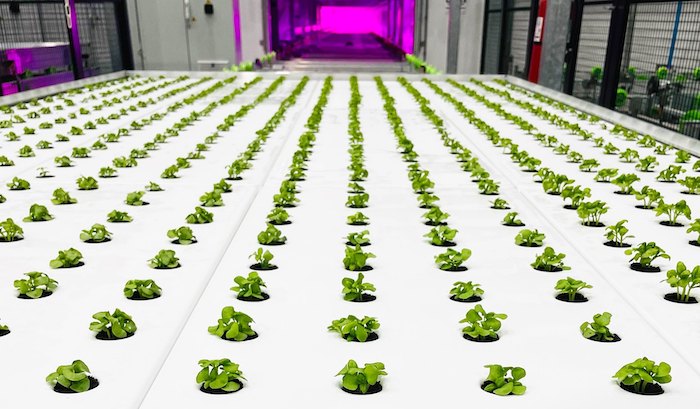80 Acres Farms to increase output by 700% amid vertical farming boom

U.S. vertical farming company 80 Acres Farms has announced a plan to increase its production output by 700% within the next 18 months with the construction of two new indoor facilities in Boone County, Kentucky and Covington, Georgia.
The vertical farms, measuring more than 200,000 square feet each, comprise a multi-million dollar investment that will initially focus on leafy greens, tomatoes, micro-greens and culinary herbs, with strawberries and blackberries likely to be added in phase two of their development.
The announcement marks the latest move in the company’s rapid expansion. Although formed in 2015, 80 Acres’ flagship commercial farm in Hamilton, Ohio only began production in early 2021, and the Kentucky and Georgia sites – which are on course to be completed by Q4 2022 and early 2023 respectively – are expected to be followed with further investments across the U.S.
The upcoming Kentucky and Georgia farms, which will mark 80 Acres’ first production sites outside Ohio, will add to 80 Acres’ five production sites located close to Hamilton, as well as a further three research and development facilities in other parts of the country.
According to the company, the indoor farms can produce up to 300 times as much food per square foot as a traditional farm, using 95% less water per pound of produce and minimizing food waste and miles.
80 Acres CEO Mike Zelkind, who founded the company with business partner Tisha Livingston, said the decision was make to expand after proving the effectiveness of its business concept and technology at the Hamilton facility, as well as hitting target yields, quality and product consistency.
“We started with very small farms from containers, and then built our first fully-automated farm in Hamilton, Ohio and we’ve been running that farm for close to two years,” he said.
“We’ve been developing next-generation technology that can grow all these crops in the same system. We’re ready, we have the design and at the same time we have to fill the customer demand that we have been fortunate to generate to date.”
“Our Ohio farms have been operating at capacity for more than a year. The only way to reach more people is to keep building. After proving our model at home, we have the experience and technology to scale up, starting in Kentucky and Georgia.”
Although the Kentucky farm will be focused on meeting existing customers’ needs, Zelkind said the larger, $120 million Georgia facility would make use of next generation technology to meet strong potential market demand. “Georgia is a phenomenal place, and we feel there is customer demand there that is underserved,” he continued.
“The $120 million is a multi-phase project over 18 months to two years, but once it starts operation the farm is profitable from day one. We would not be building a farm this size and making this kind of investment if we had not proven the economics. This farm is going to be more productive and more effective.”
Although the Covington site will concentrate on leafy greens, herbs, tomatoes and micro-greens that are “appropriate for the Georgia market” in its initial phase, Zelkind revealed 80 Acres was actively working on a wide variety of additional products that it hopes to grow at the farm, notably strawberries.
The company has been growing strawberries at a research and development center for the last five years and has only recently made them commercially available through stores in Cincinnati, Ohio. But while revealing 80 Acres was collaborating with partners in the Netherlands and Germany on “incredible genetics that will set the U.S. strawberry market on fire”, he said the company would not rush into a quick roll-out.
“Our strawberries today I believe are the best strawberries you will taste anywhere: they are pesticide-free, they are clean, but obviously we need to grow them at a level of profitability, and that’s what this farm will enable us to do,” Zelkind said. “Next is a lot more farms, but we will do it in a measured and thoughtful way.”












































